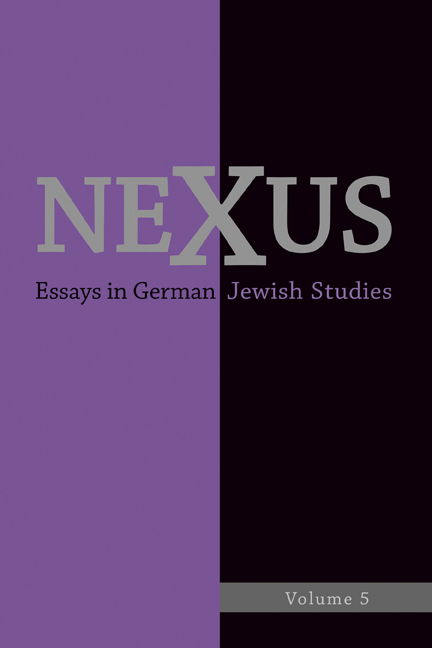 Nexus: Essays in German Jewish Studies, Volume 5
Nexus: Essays in German Jewish Studies, Volume 5 Published online by Cambridge University Press: 24 March 2021
JONATHAN HESS was always on the lookout for “moments of enlightenment,” for those opportune instances of connection between literary texts and their readers, politics and public culture, Jews and non-Jews— but also between the teacher and student, the scholar and colleague, the administrator and his institution. All the contributors to this volume— former students, colleagues both near and far—can remember some such special occasion, when Jonathan made the moment shared both light and enlightening and sealed a connection that persists to this day.
Although he had an extraordinary gift for long-term planning in all his endeavors, Jonathan always also encouraged the unscripted, the embrace of the new and unexpected. The need for planning was something he impressed on all his students, laying great stress on the meticulous craft of academic writing and producing elaborate guides to help lead them toward a satisfactory final product—but he always placed equal insistence on the essential experience of scholarly surprise and discovery. He devised, for example, a detailed guide for his students to writing an abstract, with step-by-step instructions and ending with the exhortatory aude: “The abstract is a sketch of what your final paper might look like, an imaginative exercise where you go out on a limb.” And his advice was more or less the same to his colleagues: find the connections to other scholarship, but find, too, the individual moment unprepared.
Another aspect of Jonathan's sense for the moment—besides the planning and the openness to openness—was knowing when it was “done”: not in the sense of over and finished but of reached and ready for what comes next. He applied this gift to good effect in both his own work and that of his students. One of his doctoral students remembers the time she came to his office with an acute case of cold feet, having submitted her dissertation and then gone and reread it. Now she could see only its limitations and none of its virtues. As she continued to deprecate her work, Jonathan turned to his computer and wrote her one of his typically brief emails (one line), just telling her: stop reading.
To save this book to your Kindle, first ensure [email protected] is added to your Approved Personal Document E-mail List under your Personal Document Settings on the Manage Your Content and Devices page of your Amazon account. Then enter the ‘name’ part of your Kindle email address below. Find out more about saving to your Kindle.
Note you can select to save to either the @free.kindle.com or @kindle.com variations. ‘@free.kindle.com’ emails are free but can only be saved to your device when it is connected to wi-fi. ‘@kindle.com’ emails can be delivered even when you are not connected to wi-fi, but note that service fees apply.
Find out more about the Kindle Personal Document Service.
To save content items to your account, please confirm that you agree to abide by our usage policies. If this is the first time you use this feature, you will be asked to authorise Cambridge Core to connect with your account. Find out more about saving content to Dropbox.
To save content items to your account, please confirm that you agree to abide by our usage policies. If this is the first time you use this feature, you will be asked to authorise Cambridge Core to connect with your account. Find out more about saving content to Google Drive.